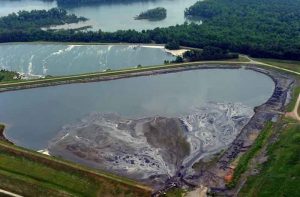
Commissioner Michael Miltich speaks at forum
April 1. By Erica Batten. Officials from the North Carolina Department of Environmental Quality spent much of January traveling to areas of the state where Duke Energy operates coal-fired electric plants. The DEQ hosted six public meetings to inform residents about cleanup options for coal ash ponds.
The result: An order from the DEQ that says Duke must excavate the coal ash move the toxic material to lined landfills.
The total cost is estimated in excess of $1 billion.
“This is a strong order that follows the science and prioritizes clean water and public health,” said NC Gov. Roy Cooper.
DEQ officials said that digging up and removing the ash was the only option to “best protect public health” after reviewing Duke’s proposals for the sites and meeting with affected communities.
“We’ve seen the damage this pollution can do including the families who had to live for years on bottled water until we were able to get them connected to permanent water solutions,” Cooper said.
Cleanup of remaining coal ash needs to move ahead “efficiently and effectively,” the governor said.
More than 350 residents attended DEQ public meeting Jan. 17 at Sherrills Ford Elementary School, just three miles from Duke’s Marshall Steam Station.
Charles Knox, a commercial Realtor with The Knox Group in Huntersville, said the utility could be accountable for declines in property values. “If property values drop, then everybody should have some claim against Duke for loss of value.”
Duke officials said all six sites have been rated as low-risk and that scientists and engineers support a variety of closure methods less costly than excavation.
Because of the region’s reliance on coal to produce energy, residents in the southeast United States are more likely to live near aging coal ash ponds, according to SoutheastCoalAsh.org, a

Catawba Coal-Ash Basin in NC
group of environmental and community groups working to raise awareness about coal ash ponds and look for legal pathways to hold utility companies responsible for environmental damage.
Last year, a group spearheaded by Susan Wind of Mooresville started a discussion of suspected cancer clusters in Iredell County after her teenage daughter, among an alarming number of other young people in two Mooresville ZIP codes, had been diagnosed with thyroid cancer.
Of Duke Energy’s 14 coal-fired plants in North Carolina, Marshall has more than a quarter of the coal ash: 16 million tons in an unlined disposal pond and about 14 million more elsewhere at the Marshall facility.
By comparison, the municipal waste for the entire state is about 14 million tons per year, said DEQ Waste Management Division Permitting Branch Supervisor Ed Mussler.
In November, Duke Energy provided a closure options analysis to the DEQ that included a community impact analysis and groundwater modeling.
Groundwater monitoring data released by Duke Energy last March indicated high levels of radium and thallium near its coal ash site, in addition to high levels of hexavalent chromium and other contaminants associated with coal ash in nearby wells.
The 2014 Coal Ash Management Act requires Duke Energy to safely dispose of coal ash. The DEQ will continue to take public comments through Feb. 15 and will complete its review by April 1. Duke Energy will then submit its final plans for closure of the coal ash basins by Aug. 1.
“We are walking through the process of what is in the law,” said Sheila Holman, DEQ’s assistant secretary for the environment.
Waste management officials from DEQ outlined three cleanup options for Marshall. The first was closure in place, in which coal ash remains in its current basin and is covered with a capping system to divert stormwater. According to Duke Energy estimates, this option would take about 15 years and cost $207 million. The utility also reports that this option will be least detrimental to the environment.
The second option was a hybrid of the first two options and will reduce the coal ash basin’s footprint by almost 200 acres. Estimated cost is $387 million, with an expected completion in 14.5 years.
The third option—closure by removal, or excavation—means all coal ash will be moved to a lined landfill on site and covered. Of the three options, excavation has the costliest and will take the longest. The pricetag is on the order of $1 billion.
The North Carolina Utilities Commission, that will ultimately decide if Duke Energy is responsible for the cost of coal ash management.
The Utilities Commission ruled last year that Duke Energy could charge customers for $546 million in cleanup costs incurred by two of its North Carolina subsidiaries between 2015 and 2017.
State Attorney General Josh Stein is appealing the ruling in the state Supreme Court.
“Duke Energy knew coal ash was toxic for years and failed to act responsibly. Therefore, it’s wrong to put all the costs of cleaning it up on the people of North Carolina,” said Stein.
But it’s not just cleanup costs that could impact consumers.
“Property devaluation from water pollution is a gradual process that follows the progression of information on the extent and severity of a pollution event and news of how long the pollution is expected to persist,” said research biologist A. Dennis Lemly in a 2014 report about the Eden coal ash spill into the Dan River in North Carolina and Virginia.
Lemly estimated the total cost of the spill’s damage to the environment, recreation and human health at $2.95 billion. This figure did not include property devaluation estimates.
As of yet, there’s no linkage between coal ash basins or any other environmental factor and the incidence of cancer in Iredell.
In South Carolina, following legal action and public pressure, every unlined coal ash pond has been either excavated to dry, lined landfills, scheduled to be excavated, or recycled.

Duke is a very profitable, net income in the billions, publicly traded company that pays out additional billions in dividends to shareholders. To even try to pass on the costs to their customers is obscene. They are effectively a monopoly with no direct competition so they can pass on costs, raise prices and not fear competitive pricing. They made the mess, and initially I am sure it was not their intent to create this problem. Not a unique situation. GE had a similar problem on the Hudson River with PCBs. They spent billions on the clean up… did they charge their customers? No, they have competition. Do what is right Duke s you and your shareholders need to suck it up, perhaps it would help if some of the outrageous executive salaries and bonuses were cut.
Posted by Gar Van Doren | April 1, 2019, 4:27 pmDUK is a publicly traded corporation. People who own this company are concerned with profits, not the health and welfare of residents living near their money pits. Responsible stockholders however,should vote “NO BONUSES or PAY INCREASE for management / company executives until this is totally cleaned up. They are never going to care unless it affects their compensation
Posted by Terry Cormier | April 2, 2019, 8:56 amI read in another article, that the buried coal ash around lake Norman was not included in the “dig up and bury in lined pits” example. The pits around lake Norman were said to be drained of water and capped. Not the disposal we wanted, and property surrounding lake Norman is prime property. Watch out LN residents. Properry values will fall. Better sell off now!!
Posted by Sandra | April 2, 2019, 10:19 am